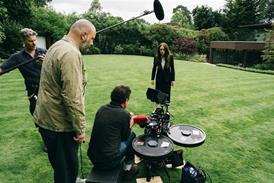- News
- Reviews
- Features
- Festivals
- Box Office
- Awards
 How the filmmaking team behind ‘Bugonia’ adapted a 2003 Korean film into a “very contemporary” black comedy
How the filmmaking team behind ‘Bugonia’ adapted a 2003 Korean film into a “very contemporary” black comedy Joachim Trier on why his fractured-family drama ‘Sentimental Value’ makes him “feel seen”
Joachim Trier on why his fractured-family drama ‘Sentimental Value’ makes him “feel seen” How nature, Ukrainian minefields and the male and female in everyone inspired Chloe Zhao’s adaptation of ‘Hamnet’
How nature, Ukrainian minefields and the male and female in everyone inspired Chloe Zhao’s adaptation of ‘Hamnet’
- Subscribe

Subscribe to Screen International
- Monthly print editions
- Awards season weeklies
- Stars of Tomorrow and exclusive supplements
- Over 16 years of archived content
- Global production
European Film Academy director Matthijs Wouter Knol steps down from anti-racism taskforce Artef (exclusive)
By Ben Dalton2023-03-20T17:14:00

Source: Berlinale/Angela Regenbrecht
Wouter Knol said he was keen to eliminate any perceived conflict of interest charges.
SIGN IN if you have an account
Do you want to keep reading?
Register for free access to five articles a month

Subscribe today and unlock access to:
- Unlimited film & TV news, reviews and analysis on Screendaily.com
- All print and/or digital editions of Screen magazine
- Breaking news alerts sent straight to your inbox
- Digital festival and market dailies
- Weekly awards magazines
Access premium content Subscribe today
If you have an account you can SIGN IN now
Subscribe to Screen International
Screen International is the essential resource for the international film industry. Subscribe now for monthly editions, awards season weeklies, access to the Screen International archive and supplements including Stars of Tomorrow and World of Locations.
Find out moreSite powered by Webvision Cloud












